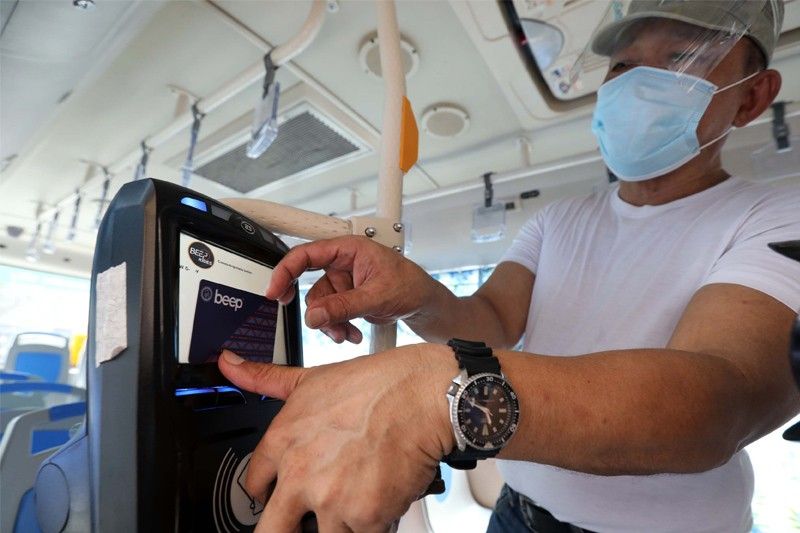DOTr threatens to suspend Beep use if cards not given free

MANILA, Philippines — The Department of Transportation (DOTr) warned the consortium behind the Beep card cashless payment system that if the cards are not given for free to commuters, the use of the cards in the EDSA busway would be suspended.
The DOTr in a statement yesterday reiterated its call for AF Payments Inc. (AFPI) to immediately remove the charge for the Beep cards, on top of the fare load. “There are other AFCS (automated fare collection system) providers and other modes of cashless transactions that PUV (public utility vehicle) operators may tap,” the DOTr said.
“Thus, should the AFPI refuse to cooperate by allowing the free use of the Beep card to commuters upon payment of the fare load, the DOTr will have to suspend its use in the EDSA busway to alleviate the burden of commuters,” the department said.
The DOTr is currently in discussions with the Mega Manila Consortium, composed of the bus operators plying the EDSA busway, and AFPI to come up with a solution to resolve the financial burden on commuters.
The DOTr said the Land Transportation Franchising and Regulatory Board (LTFRB) will issue next week a memorandum circular directing all PUV operators not to place the cost of the cashless payment system, especially the AFCS card, on the commuters.
PUVs are ordered to shift to cashless transactions to minimize and avoid human interaction to reduce the risk of exposure to the coronavirus.
According to the DOTr, PUV operators choose what AFCS they will use in their operation, following the directive for them to implement cashless transactions in public transport.
In the case of the EDSA busway, the Mega Manila consortium chose AFPI’s Beep cards for their AFCS since the card was already being used by the Metro Rail Transit, Light Rail Transit and Philippine National Railways.
AFPI in a statement Friday said Beep cards being sold at P80 is partially subsidized and that the group does not earn from its sale.
The firm said it has reduced the cost of the Beep cards during the initial phase of the automated cash fare collection system, which ran from Aug. 1 to Sept. 30, to further reduce the impact of the shift to cashless ticketing.
AFPI said it has also waived the monthly service fees for the first few months of the Beep card operations to help the bus consortiums and operators that are impacted by lower utilization of their vehicles due to the pandemic.
“At the end of the initial phase of implementation, specifically Oct. 1, the Beep cards were sold for P80 at zero-profit, still partially subsidized as the full cost upon turnover to buyer is more than P80,” it said.
There are currently seven million Beep cards in circulation, according to the consortium.
AFPI further pointed out that it does not impose a minimum load, but passengers have to ensure that there are enough funds on the card for the intended route.
The consortium has also said that the cost of the card goes directly to the manufacturer and not to AFPI.
Senators react
Senate President Pro Tempore Ralph Recto said yesterday that Beep cards for buses should be given for free to commuters, saying the cost is “just a blip in the government spending radar.”
“It (free Beep cards) is the right thing to do and both private issuer and the government can easily afford it. They have cash to fund this cashless payment system,” Recto said in a statement.
He said one million Beep cards at the reported non-discounted price of P80 each will only cost government P80 million. But the amount is still “an overindulgent estimate.”
If pegged to a daily bus ridership of 500,000, the cost will be P40 million. If limited to present EDSA bus riders, it will only be a fraction of the two figures cited above, Recto said.
Even if the government shoulders the P40 million, it is still just one-fifth of one percent of the P20.71 billion that “a generous Department of Transportation (DOTR)” voluntarily cut from its 2019 and 2020 budgets and turned over to the government’s fight against the COVID-19 pandemic.
The DOTR is asking for P143.6 billion as its budget for 2021.
During the online committee deliberations of the DOTr’s proposed budget for 2021, Sen. Sonny Angara, chairman of the Senate finance committee, asked Sec. Arthur Tugade to also work on making the Beep cards interoperable or making it usable with public utility jeepneys (PUJs).
“I appreciate the efforts made for interoperability of the different modalities by the department and they deserve the credit for that, but hopefully we could further push the envelope for consumer convenience,” Angara told Tugade.
Sen. Nancy Binay said the agency should also find ways to reduce the minimum load of P60 even as she expressed concern over the fate of the bus conductors who are expected to lose their jobs with the use of Beep cards.
Sen. Grace Poe, who chairs the committee on public services, asked Tugade to make the Beep cards loading online and that the consortium providing the cards should allow one payment system.
Tugade clarified the Beep card supplier was not selected by the DOTr but the consortium of bus operators.
He told the panel the DOTr is working on making the Beep cards usable with PUJs, particularly the modern units, and even trains and inter-island vessels.
Tugade said the DOTr will also press for the Beep cards being given free and that loading fares should also be done online.
He said that the P5 convenience fee for the Beep cards will be scrapped.
“We’re also looking at ways to commute without having to use cards, but use your cellphones through QR (codes),” he said.
Sen. Francis Pangilinan meanwhile called out the “thoughtless” implementation of the “no Beep card, no ride” policy in Metro Manila’s mass transport system that forced commuters to shell out extra cash to purchase the P80 card and maintain the required P70 balance in the card.
“Some of our workers who get their wages daily and hardly have any spare cash borrow just to pay for their fares, and now they’re forced to buy Beep cards and maintain a balance, how insensitive,” Pangilinan said. — Paolo Romero
- Latest
- Trending
































